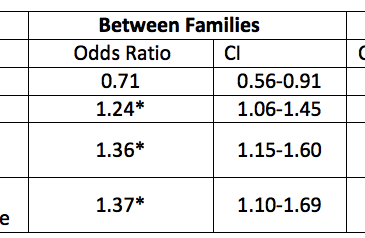People whose mothers smoked during pregnancy have an increased risk of becoming nicotine dependent themselves (Buka, Shenassa, & Niaura, 2003). Some believe that this risk is due to changes that occur in a baby’s brain while in the womb (Kardia et al, 2003), but it could also result from social forces, such as children modeling their mothers’ smoking habits. In this week’s ASHES, as part of our Special Series on Motherhood and Addiction, we review a study that examined possible physiological links between prenatal exposure to smoking and future nicotine dependence.
Methods
- The researchers used data from interviews with pregnant mothers enrolled in the Collaborative Perinatal Project (Broman, 1984) from 1959-1966. These mothers reported how many packs of cigarettes they smoked per day.
- 1,783 offspring (average age= 39.6) from the Project described their experiences with tobacco, including these key outcomes:
- Whether they ever smoked
- Whether they were dependent on nicotine
- Whether they progressed from
- Ever smoking to nicotine dependence
- Weekly smoking to nicotine dependence
- The researchers studied how a single pack increase in maternal smoking during pregnancy increased risk for each of these outcome variables.
- In some cases, the mothers smoked at different levels during different pregnancies. As a result, the researchers were able to study how maternal smoking during pregnancy impacts offspring risk within a single family (i.e., within family effects), in addition to analyzing all offspring individually (i.e., between family effects).
Results
- As Table 1 shows, when researchers examined all offspring individually or within single families, they found that maternal smoking during pregnancy did not predict whether their children ever smoked.
- However, between-family analyses revealed that children whose mothers smoked more during pregnancy were more likely to become dependent on nicotine, progress from ever smoking to nicotine to dependence, and progress from weekly cigarette use to nicotine dependence.
- When the researchers looked within individual families, they found that heavier smoking predicted progression from weekly smoking to nicotine dependence.
Table 1: Odds ratios and confidence intervals (CIs) for Smoking Outcomes Between Families and Within Families. Effects marked with asterisks are statistically significant. (Adapted from Shenassa et al, 2015.) Click image to enlarge.
Limitations
- Researchers could more precisely measure the impact of prenatal smoking if they measured other factors that differed between siblings, such as birth order and other household experiences.
- The researchers could not measure differences in maternal smoking during pregnancy by more than half-a-pack of cigarettes smoked per day. This means that they may have potentially missed some distinctions between mothers’ smoking behaviors.
Conclusions
The results of this study indicate that maternal smoking during pregnancy is risky primarily because children are more likely to become dependent on nicotine in later life, not because children are more likely to try smoking in the first place. This is in line with the addiction syndrome model, which posits that people have different levels of exposure and access to objects of addiction, but only a sub-portion of those who are exposed to those objects are at risk for developing neurobiological consequences such as chemical dependence. Future studies could further isolate the potential physiological link between maternal smoking during pregnancy and offspring nicotine dependence by investigating the relationship between nicotine receptor growth in early childhood, smoking initiation in early adolescence, and nicotine dependence later in life.
–Kat Belkin
What do you think? Please use the comment link below to provide feedback on this article.
References
Broman, S. (1984). The Collaborative Perinatal Project: an overview. In Handbook of Longitudinal Research, New York, Praeger Scientific.
Buka, S.L., Shenassa, E.D., Niaura, R. (2003). Elevated risk of tobacco dependence among offspring of mothers who smoked during pregnancy: a 30-year prospective study. American Journal of Psychiatry,160, 1978-1984.
Kardia, S.L., Pomerleau, C.S., Rozek, L.S., & Marks, J.L. (2003). Association of parental smoking history with nicotine dependence, smoking rate, and psychological cofactors in adult smokers. Addictive Behaviors, 28, 1447–1452.
Shenassa, E.D., Papandonatos, G.D., Rogers, M.L., Buka, S.L. (2015). Elevated risk of nicotine dependence among sib-pairs discordant for maternal smoking during pregnancy: Evidence from a 40-year longitudinal study. Epidemiology, 26(3), 441-447





